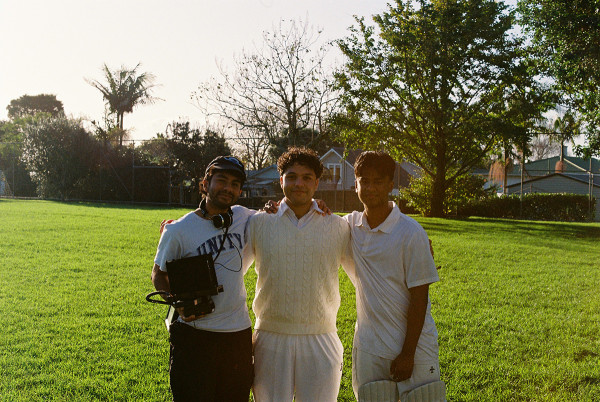By Anna Murray
With a main character that’s struggling after getting hit in the nuts with a cricket ball, upcoming short film Ballsy might appear as just a comedy - but it’s also taking aim at New Zealand’s toxic masculinity.
Ballsy is the story of a teenage Indian New Zealander named Ethan who gets hit in the balls during a game of cricket with his mate, Dwain. He lies about the pain and pretends he’s fine - until he can’t anymore.
Ballsy’s writer and director Warren Franz Rodricks spoke to Re: News about making the film and rejecting the toxic version of masculinity he was taught growing up.
I was inspired to make Ballsy based on moments from my teenage years. I was actually bowled in the balls as well.
I didn’t know how to tell anyone I was in pain and instead laughed it off.
I wasn’t even aware at the time that this would be the blueprint for me about what I thought being a man was - that when you feel pain or you're feeling down, it's something to ignore, laugh off or play off.
I kind of held this idea that boys and men must be stoic, strong, and can't show tenderness or strong emotions or sensitivity. This led to me developing quite an anxious and insecure headspace.
So, from this experience, I just wanted to give the audience a window into young boys' first experiences of feeling vulnerable, and just exposing the dangers of bottling up emotions and pain. I also wanted to show how opening up can be a remedy to all of this.
I think boys and men both just struggle with being open in general. They want to be tough, they want to be strong.
I think that's where the toxic masculinity thing plays between boys and it starts at that early age and just manifests as you grow up to be a man.

Ballsy’s writer and director Warren Franz Rodricks (L) with actors Jehangir Homavazir and Zain Hassan
I wanted to show the similarities of these stories amongst us all and have the film’s two main characters be young Indian New Zealanders.
This is because I really wanted to tell a story that I knew my community would be able to see themselves in, but also to show that ideas of masculinity in this country affect a wide range of men.
I think we draw heaps of ways in which we’re all different but I just wanted to really show this is a coming of age story that can really happen to anyone.
The being hit in the balls thing is really a metaphor for an incident in anyone's life that can happen. And how do you deal with that? I think commonly, especially for me growing up, it was to bottle it up and not talk about it.
I think all boys are held to a really tough standard.
I guess girls are kind of encouraged to be more caring, and if they do show those emotions, it's kind of normal. But if boys do, it's somewhat different.
What it is to be a man in the 21st century is talked about and it’s a significant topic in our community, but it’s still something that people just nod their head at and carry on.
I want the audience to feel encouraged after this film to reach out to their close ones.
I want them to realise if they also see someone dear to them or just anyone in general going through something, that reaching out is an option.
I want them to know that reaching out is quite a nice thing to do. And we don't do it enough. So, if that's something the audience takes away from the film, I'll be really happy.
As told to Re: News journalist Anna Murray. This interview has been edited for length.
Ballsy is one of six films in Series 7 of Someday Stories. It is premiering online on Monday, September 18.
More stories:
Why Aotearoa needs to make consent education compulsory
“My name is Liv and I’ve been sexually harassed more times than I can count.”
Toilet politics: Trans people more likely to be victims, not perpetrators
“This fear-mongering is an absolute flipping over of what’s correct and who poses a threat to who.”
No, you don't get an extra vote if you're on the Māori roll
So what is the difference between being on the Māori roll and being on the general roll?